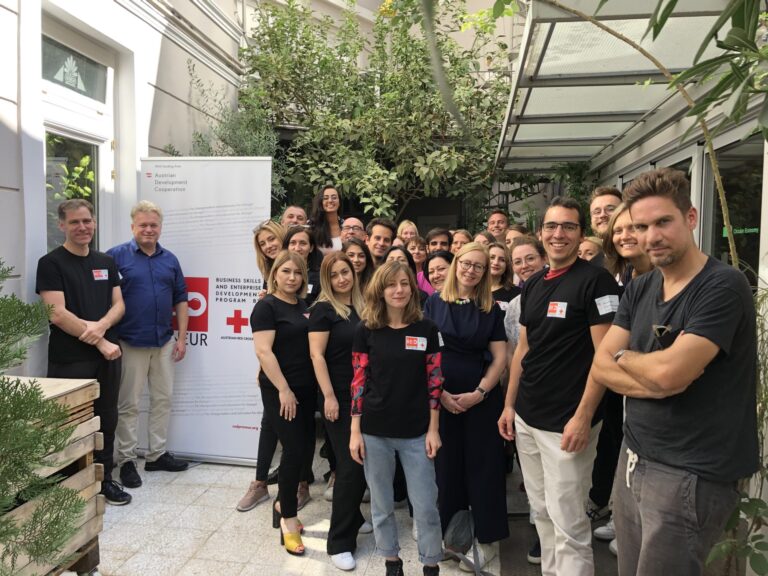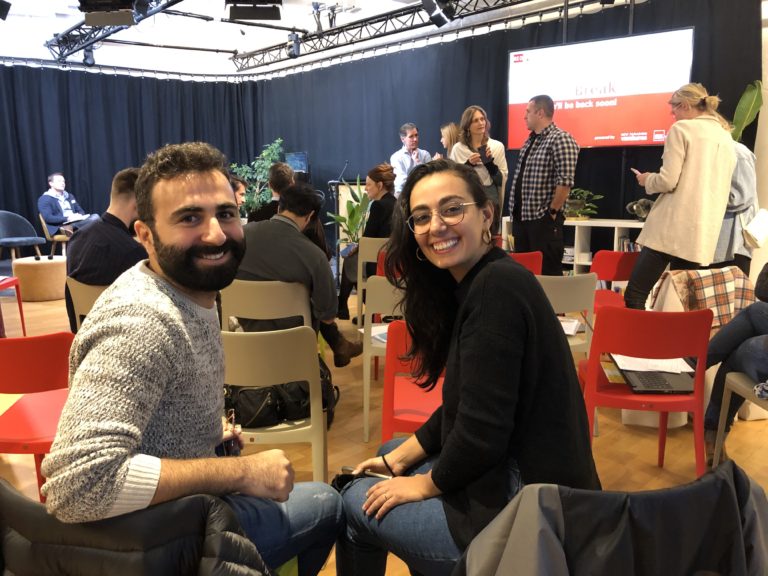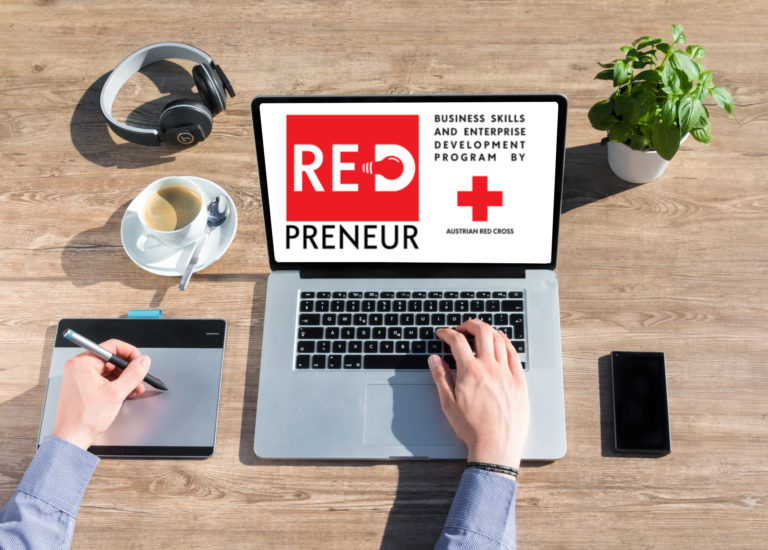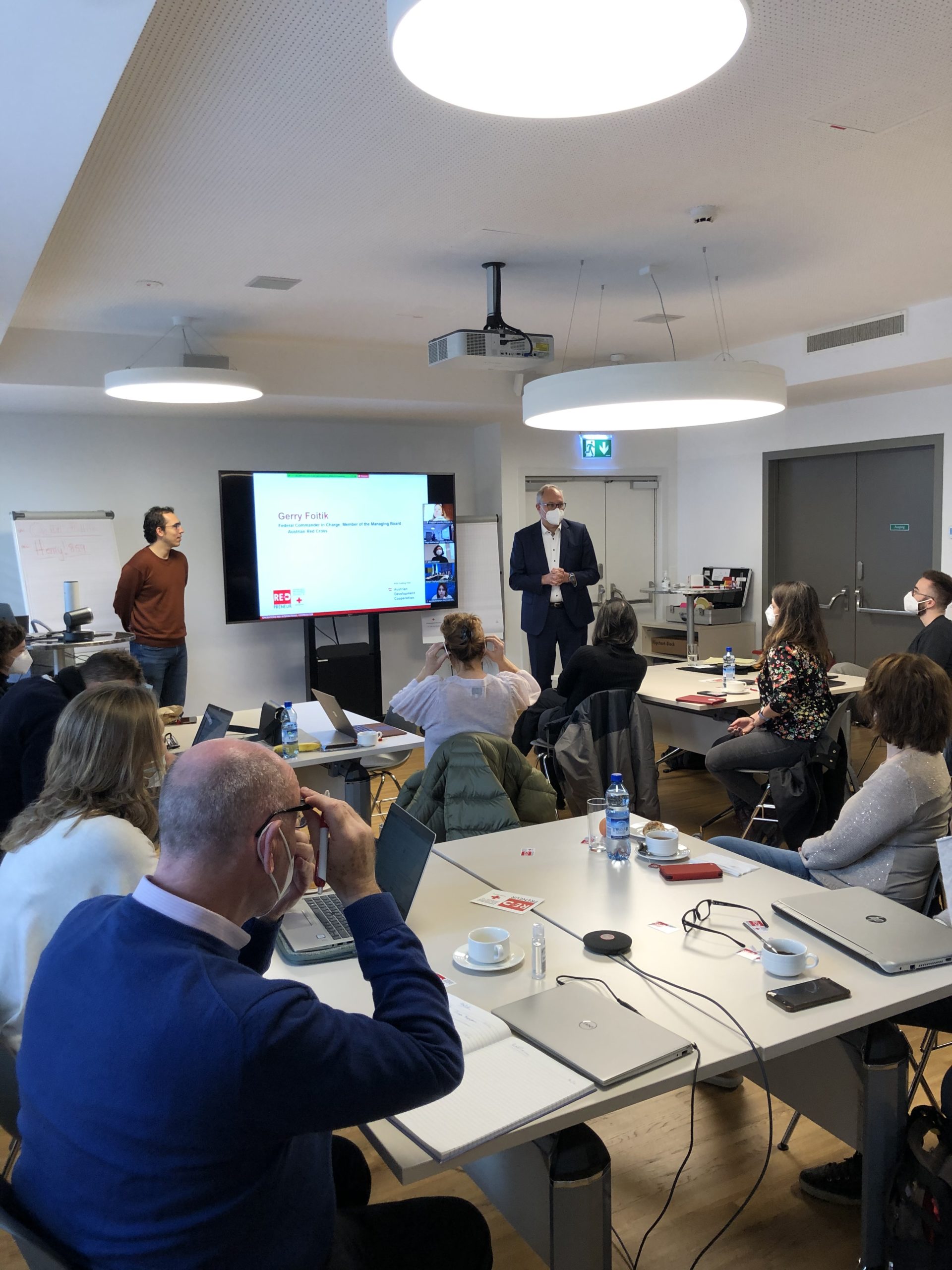How to foster innovation within a social organisation?
We are glad to share with you the first publication of RED SOCIAL INNOVATION in cooperation with the Stanford Social Innovation Review.
The Review shares Inspirations, models & methodologies developed throughout the International Red Cross & Red Crescent Movement. Read about REDpreneur and other Good Practices of Social Innovation within the Red Cross & Red Crescent Movement.
Stay updated with the latest REDpreneur news

REDpreneur is re-launching !
It’s official! REDpreneur, the innovation and acceleration program by the Austrian Red Crossto to support the development of business skills and growth of Social Businesses

REDpreneur Townhall 29/9/22: “20 min with the Red Cross”
We hope you are doing well! This month’ town hall will take place on September 29th 13-14h CET.

Financial Planning for WASH Ventures – The Skybird Experience
Please be informed that this month’s REDpreneur Town Hall will be replaced by the Skybird Event Financial Planning for WASH Ventures – The Skybird Experience on August 25 from 8:30-10:00 am CEST/9:30-11:00 EAT.

REDpreneur Townhall 28/7/22: Institutional Development Finance for Enterprise and Innovation
We hope you are doing well, enjoying the summer vibes and taking some time off to care for yourselves! This month’s town hall will take place on July 28th 13-14h CET.
The time is right for REDpreneur
Nikolaus Hutter talks about Purpose Driven Economy
The health landscape is changing globally. Demographic trends such as growing aging societies put health and social services systems in many countries under pressure to manage the rapidly increasing cost.
On the other side, a growth of income and purchasing power in the past years is opening new opportunities for financing health related activities.
In this time of new opportunities, non-profit organizations have a unique chance to establish themselves in the health and social services sector to provide services to the population paid by a mix of financing sources to be explored and to anchor one pillar of their organisations’ mission in a sustainable market-driven business. The goal is to evolve new business models that enable them to be self-reliant and financially sustainable at least in one core activity, thus stronger in providing other types of humanitarian support needed in their country.
Visit our monthly townhalls
REDpreneur Town Halls take place every last Thursday in month between 13:00 – 14:00 CET. To the Town Halls we invite all Friends of REDpreneur (Alumnis, Trainers, Stakeholder, interested persons and further guests) to connect, exchange and share updates on everything around Social Entrepreneurship.
Galleries
Explore our galleries below
REDpreneur on the RED Social Innovation Platform
REDpreneur was created by the Austrian Red Cross international cooperation department as a result of a yearlong dialogue with specialists to assess its opportunities in the impact investing field. The need for the program is based on demographic trends, structural and developmental changes as well as shifts in financing models of the public, non-profit and private sectors.
A newly established RED Social Innovation Platform by the French and Spanish Red Cross showcases selected innovations to social challenges developed in the 192 national Red Cross/Red Crescent societies.
Have a look at how REDpreneur is featured on the RED Social Innovation Platform.

Ventures incubated and accelerated by REDpreneur
Master Class 2021
Red Cross Intrapreneurs
My Personal Health Bank (DK)
Ukraine Red Cross
Red Cross of North Macedonia
Armenian Red Cross
Alumnis & Partners about REDpreneur




Entrepreneur
An entrepreneur is an individual who creates a new business, bearing most of the risks and enjoying most of the rewards. The entrepreneur is commonly seen as an innovator, a source of new ideas, goods, services, and business/or procedures. (Investopedia)
Social Entrepreneur
Social entrepreneurs are individuals with innovative solutions to society’s most pressing social problems. They are ambitious and persistent, tackling major social issues and offering new ideas for wide-scale change. (Ashoka)
Social Entrepreneurship
Takes place when a social value proposition (a solution of some kind) provides wide-scale, lasting systems change for the benefit of society. When the solution helps move a system from an equilibrium that is unjust (where there is suffering, exclusion or marginalization) and helps establish a new, more just, equilibrium then social entrepreneurship is at work. (Sally Osberg and Roger L. Martin, 2007)
Social enterprises
- Businesses whose primary focus are to use the business to solve social or environmental problems. It is important to understand that social enterprises differ from NGOs and traditional non-profits as their earned income is directly tied to their social mission. (Wolfgang Grassl, 2011)
- Any enterprise that prioritizes transformative social impact while pursuing financial sustainability. Social enterprises can have nonprofit or for-profit legal structures, but they must have two key elements: 1) A social impact mission: a clear goal to improve lives or the environment and 2) A business model: a strategy for how an enterprise will create, deliver and capture value in a sustainable way. (Acumen)
- A social enterprise is an operator in the social economy whose main objective is to have a social impact rather than make a profit for their owners or shareholders. It operates by providing goods and services for the market in an entrepreneurial and innovative fashion and uses its profits primarily to achieve social objectives. It is managed in an open and responsible manner and, in particular, involves employees, consumers and stakeholders affected by its commercial activities. (European Commission)
Social enterprises prioritize social impact, but they must also strive for financial sustainability. While they may rely on philanthropic capital, such as grants, to get their work off the ground, they ultimately look for a model that enables them to stay afloat without a constant infusion of charitable dollars. This is one of the key factors that differentiates a social enterprise from a typical non-profit organization or NGO. This means that, early on in their social entrepreneurship journey, a founder needs to determine the type of revenue engine that can effectively fuel their growth. (Acumen Social Entrepreneurship 101)
Business skills
Running a business requires a diverse set of skills from creative problem solving, to more concrete financial management and organisational development skills such as:
- Business model development and testing
- Financing modelling and financing strategy
- Sales and marketing
- Partnerships, sourcing and organisational development, and
- Ongoing financial management
Social business skills:
Smart business centers around providing the customer with a product, service, or experience that is relevant and meaningful to them. Without this connection, no exchange of value is possible. With some creativity and a keen awareness of the system as a whole, social entrepreneurs have the ability to find synergies between players in an ecosystem that were previously invisible or overlooked. These mutually beneficial connections between players can then be matched together, like pieces of a puzzle, to design revenue engines that allow a social enterprise to eventually reach financial sustainability (sometimes in combination with traditional philanthropy). Revenue engines that power social enterprise include structures that can be similar to traditional business, such as selling goods or providing services for a fee. Or, they can be more creative, like cross-compensation models where one target market or product line generates enough revenue to cover the costs of delivering to another group who might not have the same ability to pay. (Acumen)
Alumni
What our valuable former applicants are saying about us?







